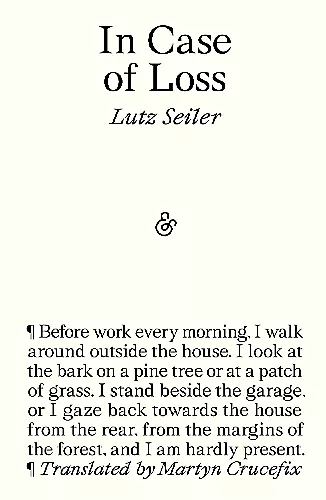In Case of Loss
Lutz Seiler author Martyn Crucefix translator
Format:Paperback
Publisher:And Other Stories
Published:28th Nov '23
Should be back in stock very soon

Evocative non-fiction from the German Book Prize winner, including on rural life, growing up in an East German uranium mining community, and the creative process
In Case of Loss reveals Seiler's essays to be different to, but on a par with, his fiction and poetry. Beautifully anecdotal and associative, they throw a light on literature and his East German background, including the Soviet-era mining community he grew up in, and are full of insight, humanity and an attention to overlooked objects and lives.
In Case of Loss reveals Seiler's essays to be different to, but on a par with, his fiction and poetry. Beautifully anecdotal and associative, they throw a light on literature and his East German background, including the Soviet-era mining community he grew up in, and are full of insight, humanity and an attention to overlooked objects and lives.
‘It is never about reconstructing. Memory does not bring back what was forgotten. Indeed, the person who remembers doesn't even know for sure that what is remembered ever existed. . . Seiler's inimitable style as a storyteller, the wilful waywardness and weight of what he has to say, the intensity (and personal tact) of his engagement with the landscapes of others' poetries and lives all make these essays a lively portrait of the writer surrounded by his library. Seiler sets standards for reflection in art today. At the same time, he gives us a sense of the pagan-sacramental importance of objects in poetry.’ Sibylle Cramer, Süddeutsche Zeitung
‘It is never about reconstructing. Memory does not bring back what was forgotten. Indeed, the person who remembers doesn't even know for sure that what is remembered ever existed. . . Seiler's inimitable style as a storyteller, the wilful waywardness and weight of what he has to say, the intensity (and personal tact) of his engagement with the landscapes of others' poetries and lives all make these essays a lively portrait of the writer surrounded by his library. Seiler sets standards for reflection in art today. At the same time, he gives us a sense of the pagan-sacramental importance of objects in poetry.' Sibylle Cramer, Süddeutsche Zeitung
‘Served by a trio of stellar translators, And Other Stories has done a great service bringing these three works into English. They will allow a new audience to enter Lutz Seiler’s haunted world and admire his singular voice in its different refractions.’ Karen Leeder, Times Literary Supplement
‘We see the “fascination of the factual”, but also the struggle to find a voice and shape the urgent material of reality. Many of the essays turn on origins and how to narrate history, venturing back to childhood, conscription, early poems, places of personal significance and some of the author’s great literary predecessors and mentors, including Peter Huchel, Jürgen Becker and Ernst Meister.’ Karen Leeder, Times Literary Supplement
ISBN: 9781913505783
Dimensions: unknown
Weight: 186g
192 pages